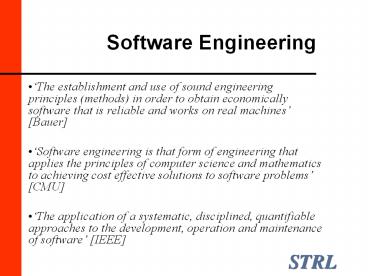Software Engineering - PowerPoint PPT Presentation
Title:
Software Engineering
Description:
Software Engineering The establishment and use of sound engineering principles (methods) in order to obtain economically software that is reliable and works on ... – PowerPoint PPT presentation
Number of Views:57
Avg rating:3.0/5.0
Title: Software Engineering
1
Software Engineering
- The establishment and use of sound engineering
principles (methods) in order to obtain
economically software that is reliable and works
on real machines Bauer - Software engineering is that form of engineering
that applies the principles of computer science
and mathematics to achieving cost effective
solutions to software problems CMU - The application of a systematic, disciplined,
quantifiable approaches to the development,
operation and maintenance of software IEEE
2
Software Engineering
Principles
- Computing is a broad field that extends well
beyond the boundaries of any one computing
discipline. - SE draws its foundation from a wide variety of
disciplines. - The rapid evolution and the professional nature
of SE requires an ongoing review of the
corresponding curriculum.
3
Software Engineering
Principles
- The development of SE curriculum must be
sensitive to changes in technologies, practices
and applications. - Any SE curriculum must be based on an appropriate
definition of software engineering knowledge. - International dimension of SE must be recognised.
- Aspects of professional practices must be
included in any curriculum.
4
Software Engineering
Student Outcomes
- Show mastery and critical thinking of the SE
knowledge and skills and professional issues
necessary to begin practice/research as an SE. - Work as individual or as part of a team to
develop and deliver high quality software
artifacts , being able to analyse its level of
quality. - .Identify, analyse, and Reconcile conflicting
project objectives, finding acceptable
compromises within limitations of cost, time,
knowledge, existing systems and organisations.
5
Software Engineering
Student Outcomes
- Analyse, Design and document appropriate
solutions in more than one one or more
application domains using SE approaches that
integrate ethical, social, legal and economic
concerns - Demonstrate an understanding of and Critically
analyse and apply current the most
appropriate of theories, models and techniques
that provide a basis for problem identification
and analysis, software design, development,
implementation, verification and documentation.
6
Software Engineering
Student Outcomes
- Demonstrate an appreciation and understanding
for Critically analyse the importance of
negotiation, effective work habits, leadership
and good communication with stakeholders in a
typical software environment. - Learn new models, techniques and technologies as
they emerge and appreciate the necessity of such
continuing professional development.
7
Software Engineering
Knowledge Areas
- Computing Essentials
- Mathematical and Engineering Fundamentals
- Professional Practice(s)
- Software Modelling and Analysis
- Software Design
- Software Verification and Validation
- Software Evolution
- Software Process
- Software Quality
- Software Management
8
Software EngineeringSystems and
Application Specialists
- Students should specialise in one or more areas.
For each application - area, students should obtain breadth in the
related domain knowledge - while they are obtaining a depth of knowledge
about The design of a - particular system.
- Creative Computing
- Network-centric systems web-based, networking,
security - Information systems and data processing
databases, business admin. - Financial and e-commerce security, accounting,
finance - Fault-tolerance and survivability security,
distributed systems, failure -
analysis and recovery - Highly secure systems network, security,
cryptography - Safety critical systems formal methods,
verification, proofs - Embedded and real-time systems scheduling
theories/algo., languages - Biomedical systems Bioinformatics, health
informatics, visualisation - Scientific systems
- Telecommunication systems
- Avionic systems
9
Possible modules from STRL I.
Research Methods
- On doing research
- - What does it mean?
- - How Methodologies?
- On presentation.
- On writing thesis and/or papers.
- On supervision (and being supervised).
- Workshops given by experience researchers.
10
Possible modules from STRLII. Formal Methods
Engineering
- Large scale programming and systems
- Compositional theory Specification and
Verification - Executable specification
- Model checking
- Refinement and program construction
- FM in software testing
11
Possible modules from STRL III.
Dependable Software
- The module will treat the following subjects from
three dimensions - gt modelling
- gt analyses
- gt certification
- On Dependability
- On Fault-tolerance
- On Security and Trust
12
Possible modules from STRL IV.
Real-Time Systems
- Taxonomy of time constraints
- Models for real-time systems
- Linguistic support for real-time system
implementation - Scheduling theory and algorithms
- Verification and analysis of real-time systems
- On hybrid systems
13
Possible modules from STRL V. The
Social Dimension of Software
Systems
- Society and SE
- Ethics and ethical considerations
- Risk factors and analysis
- Implementation of ethical dimension in SE
- Case study 1 Electronic Patient Records
- Case Study 2 Electronic Voting































